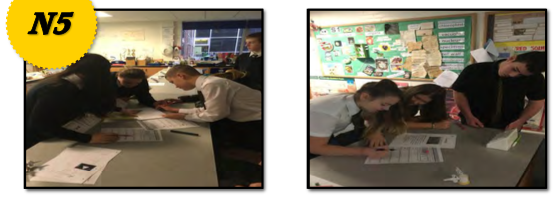Biology
What will I learn?
The N5 Biology course covers major areas of biology ranging from cellular to whole organism and includes the study of ecosystems. The focus on cellular level processes leads to an understanding of the importance and roles of the cell. By comparing the processes in multicellular plants and animals, candidates investigate increasing levels of complexity. The key areas of biodiversity and interdependence are covered, along with the processes leading to evolution as well as food security and ethical issues.
The course content includes the following areas of biology:
Cell biology
The key areas covered are: cell structure; transport across cell membranes; DNA and the production of proteins; proteins; genetic engineering; respiration.
Multicellular organisms
The key areas covered are: producing new cells; control and communication; reproduction; variation and inheritance; transport systems — plants; transport systems — animals; absorption of materials.
Life on Earth
The key areas covered are: ecosystems; distribution of organisms; photosynthesis; energy in ecosystems; food production; evolution of species.
How will I learn?
Learners will develop and apply their knowledge of Biology by working collaboratively to carry out experiments, research tasks and presentations. This will enable them to develop their scientific inquiry, investigative and analytical thinking skills in a biological context. They will also have opportunities to discuss and debate the moral and ethical implications of current biological issues.
There will be opportunities for the development of literacy and numeracy skills and where appropriate, aspects of health and wellbeing and ICT will be included.
How will I be assessed?
Question Paper (100 marks) – accounts for 80% of the total marks for external assessment. The question paper has two sections: Section 1 contains multiple-choice questions and has 25 marks. Section 2 contains structured and extended response questions and has 75 marks.
Course Assignment (20 marks) – The assignment requires learners to research a topic in Biology, carry out relevant experimental work and prepare a report on their findings. It accounts for 20% of the total marks for external assessment.
Career Opportunities
There are many and varied career opportunities for students of Biology including research, teaching, medicine, dentistry, nursing, midwifery, physiotherapy, occupational health, pharmacy, sport sciences, food industry, veterinary medicine, zoology/animal care, forensics, hairdressing, farming, renewable energy, etc. The skills developed in Science subjects can also lead to careers in many other areas.

Chemistry
What will I learn?
The National 5 Chemistry Course enables learners to develop and apply knowledge and understanding of chemistry. Learners also develop an understanding ofchemistry’s role in scientific issues and relevant applications of chemistry, including the impact these could make in society and the environment.
The course content includes the following areas of chemistry:
Chemical Changes and Structure
In this area, topics covered are: rates of reaction; atomic structure and bonding related to properties of materials; formulae and reacting quantities; acids and bases.
Nature’s Chemistry
In this area, topics covered are: homologous series; everyday consumer products; energy from fuels.
Chemistry in Society
In this area, topics covered are: metals; plastics; fertilisers; nuclear chemistry; chemical analysis.
How will I learn?
Learners will develop and apply their knowledge of Chemistry by working collaboratively to carry out experiments, research tasks and presentations. This will enable them to develop their scientific inquiry, investigative and analytical thinking skills in a chemical context. They will also have opportunities to discuss and debate the moral and ethical implications of current chemical issues.
There will be opportunities for the development of literacy and numeracy skills and where appropriate, aspects of health and wellbeing and ICT will be included.
How will I be assessed?
Question Paper (100 marks) – accounts for 80% of the total marks for external assessment. Section 1 contains multiple-choice questions and has 25 marks. Section 2 contains structured and extended response questions and has 75 marks.
Course Assignment (20 marks) – The assignment requires learners to research a topic in Chemistry, carry out relevant experimental work and prepare a report on their findings. It accounts for 20% of the total marks for external assessment.
Career Opportunities
There are many and varied career opportunities for students of Chemistry including research, teaching, medicine, dentistry, pharmacy, engineering, food industry, veterinary medicine, forensics, oil/gas/ nuclear industries, pharmaceutical industry, environmental monitoring, renewable energy, hairdressing, farming, technology, etc. The skills developed in Science subjects can also lead to careers in many other areas.

Environmental Sciences
What will I learn?
The National 5 Environmental Science Course aims to develop a scientific understanding of environmental issues. It provides a broad and up-to-date selection of ideas relevant to the role of environmental science in society. This develops an understanding of environmental issues and possible solutions to preventing or reversing environmental degradation, and of sustainable practices.
The course content includes the following areas of environmental science:
Living environment
The key areas covered are: investigating ecosystems and biodiversity; interdependence; human influences on biodiversity.
Earth’s resources
The key areas covered are: an overview of Earth systems and their interactions; the geosphere; the hydrosphere; the biosphere; the atmosphere.
Sustainability
The key areas covered are: an introduction to sustainability; food; water; energy; waste management.
How will I learn?
Learners will develop and apply their knowledge of Environmental Science by working collaboratively to carry out experiments, research tasks and presentations. This will enable them to develop their scientific inquiry, investigative and analytical thinking skills in an environmental context. They will also have opportunities to discuss and debate the moral and ethical implications of current environmental issues.
There will be opportunities for the development of literacy and numeracy skills and where appropriate, aspects of health and wellbeing and ICT will be included.
How will I be assessed?
Question Paper (100 marks) – accounts for 80% of the total marks for external assessment. Section 1 contains restricted response questions and has 66 marks. Section 2 contains a case study and has 20 marks. Sections 3 contains extended response questions and has 14 marks.
Course Assignment (20 marks) – The assignment requires learners to research a topic in Environmental Science, carry out relevant experimental work and prepare a report on their findings. It accounts for 20% of the total marks for external assessment.
Career Opportunities
There are many and varied career opportunities for students of Environmental Science including research, teaching, renewable energy, marine biology, conservation, waste management, water treatment, environmental monitoring, horticulture, etc. The skills developed in Science subjects can also lead to careers in many other areas.

Physics
What will I learn?
The National 5 Physics Course enables learners to develop a deeper understanding of physics concepts and the ability to describe and interpret physical phenomena using mathematical skills.
The course content includes the following areas of physics:
Dynamics
In this area, the topics covered are: vectors and scalars; velocity– time graphs; acceleration; Newton’s laws; energy; projectile motion.
Space
In this area, the topics covered are: space exploration; cosmology. Electricity
In this area, the topics covered are: electrical charge carriers; potential difference (voltage); Ohm’s law; practical electrical and electronic circuits; electrical power.
Properties of Matter
In this area, the topics covered are: specific heat capacity; specific latent heat; gas laws and the kinetic model.
Waves
In this area, the topics covered are: wave parameters and behaviours; electromagnetic spectrum; refraction of light.
Radiation
In this area, the topic covered is nuclear radiation.
How will I learn?
Learners will develop and apply their knowledge of Physics by working collaboratively to carry out experiments, research tasks and presentations. This will enable them to develop their scientific inquiry, investigative and analytical thinking skills in a physical context.
There will be opportunities for the development of literacy and numeracy skills and where appropriate, aspects of health and wellbeing and ICT will be included.
How will I be assessed?
Question Paper (135 marks) – accounts for 80% of the total marks for external assessment. Section 1 contains multiple-choice questions and has 25 marks. Section 2 contains structured and extended response questions and has 110 marks.
Course Assignment (20 marks) – The assignment requires learners to research a topic in Physics, carry out relevant experimental work and prepare a report on their findings. It accounts for 20% of the total marks for external assessment.
Career Opportunities
There are many and varied career opportunities for students of Physics including research, teaching, medicine – diagnosis and treatment, renewable energy, electrical/mechanical/civil engineering, electronics, oil/gas/nuclear industries, construction, transport, telecommunications. The skills developed in Science subjects can also lead to careers in many other areas.


